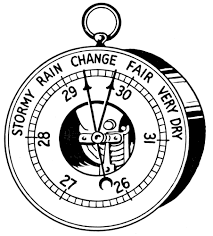II Peter 1:10 – Therefore, brothers, be all the more diligent to confirm your calling and election, for if you practice these qualities you will never fall.
In our last post, we looked at the Christian graces that Peter encouraged his readers to cultivate in their lives. These included virtue, knowledge, self control, patience, godliness, brotherly concern and love.
 Christians who exhibit these traits will not fail to be fruitful in the kingdom of heaven. Christians who lack these things are 'blind' – their eyes and hearts are focused on this world, rather than spiritual things. At best, the cares of this life choke out any fruit they might have produced in the kingdom of heaven. Worst case scenario, they could fall away from their faith entirely.
Christians who exhibit these traits will not fail to be fruitful in the kingdom of heaven. Christians who lack these things are 'blind' – their eyes and hearts are focused on this world, rather than spiritual things. At best, the cares of this life choke out any fruit they might have produced in the kingdom of heaven. Worst case scenario, they could fall away from their faith entirely.
Because of this (therefore), Christians need to be diligent to 'confirm their calling and election'. What does Peter mean by that?
Election means 'divine choice, the predestination of individuals as objects of mercy and salvation; the Christian community as a whole (the elect)'.
God has elected or chosen to offer eternal life to all of mankind through his plan of salvation. As you know, this plan consisted of God sacrificing his Son on the cross to make atonement for our sin.
John 3:16 – For God so loved the world that he gave his only begotten Son that whosoever believes in him should not perish, but have eternal life.
Notice that redemption is available to everyone (the world, whosoever).
God not only elected to make redemption available, he also calls us to it. In other words, Holy Spirit calls or draws sinners to himself by bringing conviction for sin, and offering redemption through the blood of Christ.
At that point (when we feel that call/conviction), God gives us a choice – we can reject his offer and continue in sin/death, or we can accept his offer and allow Jesus to be Lord of our life.
Those who have accepted Jesus as Lord should continually be growing in their Christian walk and becoming more and more like Christ (II Corinthians 3:17-18). Specifically, we should expect to see growth and development of the Christian graces in our lives.
Now, let's switch topics for a minute. Our new topic is 5th grade science.
Question: What is a barometer?
(If you got that right, be sure to reward yourself! For some of us, it has been a LONG time since fifth grade!)
Anyway, you can't physically see the pressure of the atmosphere, can you? But you can see how it changes the level of mercury within a barometer. And based on the measurement/changes, you can estimate what the weather is going to be.
In this passage, Peter is referring to a 'barometric confirmation' of our faith. We can't see our Christianity with our physical eyes. But we can determine or measure its progress in different ways. If our actions correspond with our profession of faith (if we see a steady growth of the Christian graces in our lives), then we can confirm or assure ourselves that we are true believers in Christ. This is also a confirmation of our faith to others.
 This was very important for the Christians of Peter's day, because there were many false teachers infiltrating the church, trying to lure Christians into false beliefs. But the 'barometer of confirmation' assured believers that they were in a true relationship with God. They could have peace of mind about this matter; they were not tormented by doubts that the false teachers tried to plant in their minds.
This was very important for the Christians of Peter's day, because there were many false teachers infiltrating the church, trying to lure Christians into false beliefs. But the 'barometer of confirmation' assured believers that they were in a true relationship with God. They could have peace of mind about this matter; they were not tormented by doubts that the false teachers tried to plant in their minds.
This is still a good tool for us today. There are still false teachers running around. There are churches that meet every week and exercise religious rituals, but are not part of the true family of God. One way to confirm to yourself that your Christianity is real is to look at your graces and check their progress.
Peter assures his readers that if the graces are growing, we can be confident in our faith. If we diligently practice the growth of these in our lives, we will not fail in our walk with God.
In summary: Election is of God; only he made the plan of salvation and only he carried it out. Calling is also of God – he calls men to himself via Holy Spirit. Our works cannot ever earn our salvation. Our calling and election do not depend on good works or virtue; but good works/virtue (Christian graces) are evidence of the calling and election we possess.
II Peter 1:11 – For in this way there will be richly provided for you an entrance into the eternal kingdom of our Lord and Savior Jesus Christ.
Here, the apostle speaks of an entrance. What kind of an entrance is he referring to?
He likens the believer's entrance to heaven to the entrance of a victorious Roman general into his home city.
Adam Clarke's Commentary on the Bible describes the Roman ritual this way:
On such occasions the general was usually clad in a rich purple robe, interwoven with figures of gold, setting forth the grandeur of his achievements; his buskins were beset with pearls, and he wore a crown, which at first was of laurel, but was afterwards of pure gold. In one hand he had a branch of laurel, the emblem of victory; and in the other, his truncheon. He was carried in a magnificent chariot, adorned with ivory and plates of gold, and usually drawn by two white horses. (Other animals were also used: when Pompey triumphed over Africa, his chariot was drawn by elephants; that of Mark Antony, by lions.)
His children either sat at his feet in the chariot, or rode on the chariot horses. To keep him humble amidst these great honors a slave stood at his back, casting out incessant railings, and reproaches; and carefully enumerating all his vices, etc. Musicians led up the procession, and played triumphal pieces in praise of the general.
Next followed carts loaded with the spoils taken from the enemy, with their horses, chariots, etc. These were followed by the kings, princes, or generals taken in the war, loaded with chains. Immediately after these came the triumphal chariot, before which, as it passed, the people strewed flowers, and shouted Io, triumphe!
Wow! That would be quite an entrance into one's home city, wouldn't it? While it sounds exotic to us, it was a familiar ritual to all of the people under the Roman Empire, whether they were Christians or not. They may or may not have personally witnessed it, but they knew about it.
Peter draws a parallel between the coming home of a triumphant Roman soldier and the coming home/entrance to heaven of a triumphant Christian soldier. Those who fully embrace Christ in their lives, as evidenced by the adding of the Christian graces, can expect to receive a very warm and victorious entry into heaven!
Did you know that scripture speaks of 4 different classes of people?
- There are some who are opposed to Christ (infidels or heathens). They will never enter the kingdom of heaven (Revelation 21:27).
- Others are said to be close to the kingdom of heaven, inferring that they will eventually make a decision for Christ (Mark 12:34).
- There is a third group who are 'saved by fire' (I Corinthians 3:15), meaning that they have no good works or growth added to their salvation. An example of this would be someone saved on their deathbed.
- Finally, there is a group who will experience an abundant entrance into heaven. These are fruitful Christians who are daily growing in Christ. They will not only experience a warm welcome into the kingdom, but a more ample reward for eternity.
Which group are you in?
II Peter 1:12 – Therefore I intend always to remind you of these qualities, though you know them and are established in the truth that you have.
Because these truths are so important, Peter is going to take every opportunity to remind believers of them. This is reflective of his work as both an apostle and a pastor.
Pastors do reveal new truths to their congregants. The truth was always there in scripture, though they may not have noticed it or understood it.
 But the majority of the pastor's labor is spent in reminding people of well known truths that they have not yet implemented in their lives. Let's be honest - sometimes truth can be lost in the midst of living daily life; reminders to holy living are necessary for us all.
But the majority of the pastor's labor is spent in reminding people of well known truths that they have not yet implemented in their lives. Let's be honest - sometimes truth can be lost in the midst of living daily life; reminders to holy living are necessary for us all.
Thank the Lord for pastors who never grow weary in coaching their flock to victory in their Christian race!
For our part, let's make sure we are 'coachable' that we allow God to impact/change our lives through the teachings and guidance (reminders) of our pastor. If we work with our pastor instead of against him/her, we will benefit greatly (Hebrews 13:17).
II Peter 1:13-15 – I think it right, as long as I am in this body, to stir you up by the way of reminder, since I know that the putting off of my body will be soon, as our Lord Jesus Christ made clear to me. And I will make every effort so that after my departure you may be able at any time to recall these things.
Essentially, Peter tells his readers that as long as he is on earth, it is his duty to spur them on to a diligent performance of their Christian duties and to keep a careful eye on spiritual matters. Again, this is the duty shared by all apostles and ministers of Christ.
Peter probably feels this duty more acutely than ever, as he senses that he is nearing the end of his earthly life. Soon, he will be martyred (crucified) for Christ, as Jesus revealed to him:
John 21:18-19 - Verily, verily, I say unto you, when you [Peter] were young, you dressed yourself, and walked where you would: but when you shall be old, you shall stretch forth your hands, and another shall dress you, and carry you where you would not. This spoke he [Jesus], signifying by what death he [Peter] should glorify God. And when he had spoken this, he said unto him, Follow me.
When people sense they are coming to the end of their lives, they often focus on what they consider to be the most important things in life. They may share memories with you, reveal family secrets or give you some of their special possessions. They will often try to mend relationships or express their love towards family and friends.
Peter is approaching the end of his earthly life, and it was a really unusual life! Consider what we know about the apostle Peter: He saw the miracles of Jesus. He witnessed the transfiguration. He heard the teachings and understood the parables. He walked on water. He was at the first communion. He was schooled in the Old Testament law, then after spending three years with Jesus, he came to an understanding of how the Law was fulfilled in Christ. He was a first hand witness as the New Covenant was ushered in to replace the old. He spent time with Jesus after his resurrection.
Amongst all the tremendous and miraculous things that he learned in life, what did he find most important? Assuming he was speaking to Christians, what did he want to emphasize/to highlight/to continue to call to our remembrance? What did he want us to keep in the forefront of our minds?
Faith in Christ, and the necessity of experiencing and practicing the graces/virtues of the Christian life, until we are called to heaven.
This is important because believers who are established in the truth will not be shaken by the winds of false doctrine. And nothing can give greater comfort in the closing moments of life than to know that we have faithfully followed/served Jesus and sought his glory.
Had Peter lived in our day, he would probably have written multiple best selling Christian books. He could have filled many of them with the wisdom and knowledge he gained from spending time with Jesus.
Instead, Holy Spirit chose to preserve for us just two rather short letters. And through the power of the Spirit these letters accomplish Peter's goal - to serve as a reminder of the important doctrines of Christianity, preserved as a reference for future generations of believers.
In verses 16-18, Peter refers to the transfiguration of Christ which was witnessed by himself along with James and John. The account of the transfiguration can be found in Luke 9:28-36 and Matthew 17:1-9. It is too long to copy into this post, so please take a moment to read it before continuing on.
II Peter 1:16 – For we did not follow cleverly devised myths when we made know to you the power and coming of our Lord Jesus Christ, but we were eyewitnesses of his majesty,
Before and after the coming of Jesus, mankind has worshipped false gods and created false religions. Fueled by Satan, these gods spring from the evil of men's hearts and imaginations. They were frequently contrived to please and gratify men's desires with the eventual goal of deceiving and perverting their judgment and conduct. And they have been very successful. Passed on from generation to generation as truth, entire cultures have been enslaved to evil and darkness.
Most false religions have their origins shrouded in mystery with one or maybe two witnesses, along with one great appearance or alleged miraculous sign.
Unlike false religions, the gospel message of Jesus Christ is the true council of God. It is the genuine and infinitely wise plan of a loving Father who has made a way of salvation through his Son. It was never done in secret or shrouded in mystery. Through the preaching of the gospel and the working of miracles, the power and coming of Jesus have been clearly revealed to anyone who will listen.
The coming of Messiah was long predicted in scripture; it began immediately after the fall (Genesis 3:15). The promise can be traced all through the Old Testament and into the New. All along the way, God gives us ample evidence that he is carefully watching over his plan to bring it to pass at the perfect moment. When the time was right, the prediction/promise of the coming of Messiah was fulfilled when Jesus Christ came to earth, born of a woman.
The power of Jesus was clearly manifested while he was on earth. The miracles he performed bore witness to the truth of the gospel message. And the truth of the gospel message is this: Only the power of Jesus is able to save to the uttermost all sinners that come to God through him. Nothing but the blood of Christ is able to wash away all guilt and sin.
There were hundreds if not thousands of witnesses to the power and resurrection of Christ, but Peter was witness to a special manifestation of the divinity of Jesus during the transfiguration.
II Peter 1:17-18 – For when he received honor and glory from God the Father, and the voice was borne to him by the Majestic Glory, "This is my beloved Son, with whom I am well pleased," we ourselves heard this very voice borne from heaven, for we were with him on the holy mountain.
Again, Peter is drawing on the evidence of his eyewitness account to proclaim the validity and truth of Jesus Christ as the Messiah, which in turn validates the gospel message.
As Peter, James and John witnessed the glory and divine majesty of Jesus, they also heard God honoring his Son:
Matthew 17:5 - While he yet spoke, behold, a bright cloud overshadowed them: and behold a voice out of the cloud, which said, This is my beloved Son, in whom I am well pleased; hear you him.
God himself confirmed that Jesus was the long promised Messiah by bestowing honor and glory upon him. Honor refers to the statement of God and glory refers to the light of Christ's countenance. The three apostles were both eye witnesses and ear witnesses of this event. It was not a vision or a hallucination. It was a real experience.
The statement 'this is my beloved Son' declares that without question Jesus was the promised Messiah. Because that is true, everything contained within the Law (represented by Moses) and the Prophets (represented by Elijah) regarding the Messiah applies to Jesus.
It also means that all future prophesy concerning the Messiah (his return to earth, his defeat of Satan, his 1000 year reign, etc) are also true and we can have the utmost confidence that these events will occur as prophesied at their appointed times.
Because God the Father loves Jesus, he also loves all those who have faith in Jesus. Because God the Father is pleased with Jesus, he is also pleased with all those who have faith in Jesus. In fact, it is ONLY through faith in Jesus that we can be accepted by God and become his adopted children.
As a final note, the mountain on which this occurred is not definitely identified, though tradition names the location as Mount Tabor. This mountain was not holy in and of itself; rather it had relative holiness - any place where God is, is holy (Exodus 3:4-5). Therefore, this was a holy place at the time the transfiguration occurred.
II Peter 1:19 – And we have the prophetic word more fully confirmed, to which you will do well to pay attention as to a lamp shining in a dark place, until the day dawns and the morning star rises in your hearts,
We – Christians.
Have the prophetic word – Prophesies that related to the Messiah.
More fully confirmed – The three apostles (Peter, James and John) had seen/heard the transfiguration of Jesus and bore witness that Jesus was the Messiah.
However, the Holy Scriptures are also a witness – a more fully confirmed witness. Here is why:
The prophesies about Messiah are found throughout the Old Testament. They are very numerous, given by different individuals, at different times, and by their sheer number they provide a stronger proof of truth than a single manifestation (the transfiguration), no matter how clear and glorious the manifestation was.
These prophesies were recorded (preserved in writing), so that they remained unchanged and could later (hundreds of years) be compared to the events that actually occurred. By making this comparison, a sound judgment could be made (by anyone) about the identity and work of the Messiah.
 Because these prophesies were numerous and given well in advance of the events of the transfiguration, hearers of the word can be sure that there was no secret collusion by the apostles to artificially make Jesus the Messiah. In other words, they did not make up the events of the transfiguration just to fool people into believing in Jesus was the Messiah. There were many other proofs that testify of this truth.
Because these prophesies were numerous and given well in advance of the events of the transfiguration, hearers of the word can be sure that there was no secret collusion by the apostles to artificially make Jesus the Messiah. In other words, they did not make up the events of the transfiguration just to fool people into believing in Jesus was the Messiah. There were many other proofs that testify of this truth.
You will do well to pay attention to - All Christians should study or pay close attention to these prophesies, because they provide the evidence/confirmation that our belief in Jesus is not vain.
As a lamp shining in a dark place – The prophesies act as a light source that illuminated the identity and work of the Messiah before he came to earth (when our understanding was darkened). Although they did not give perfect light or perfect understanding of the Messiah and his work, they enabled us to see/understand/confirm things which would otherwise be invisible or hidden to us.
Until the day dawns - There is a comparison here between a lamp shining in darkness and the morning light. When you see things by a lamp shining at midnight, your vision is somewhat obscured. While you get a general idea of what you are looking at, you can't see all the details. However, when the light of day dawns, things become illuminated and the details become clear.
In the same way, Old Testament prophesies gave us a limited view of the Messiah, but now that Jesus has actually come, the truth shines like daylight, fully making the gospel clear.
Let's consider an example. In Isaiah 42:1-9, we find a really complex prophesy concerning the Messiah. Feel free to examine the entire passage, but we are just going to take a quick look at one verse:
Isaiah 42:7 - To open the blind eyes, to bring out the prisoners from the prison, and them that sit in darkness out of the prison house.
People who lived during the time of Jesus could have looked back at this passage from Isaiah and compared it to what they knew about Jesus. Did Jesus open the eyes of the blind? Obviously, the answer is yes! In fact, Jesus almost certainly healed the eyes of many, many more blind people than the New Testament mentions.
And Jesus not only opened physical eyes, he opened spiritual eyes/understanding as well. (This is the part that was probably obscured until Jesus actually came). Those who had their spiritual eyes opened believed on him as Messiah and they were set free from the prison of sin and death.
So, we see that there were prophesies that were only partially or incompletely understood by people before the Messiah came. However, after Jesus actually came to earth and completed his mission, those prophesies were brought to light or made more clear by the actual events they referred to.
Here is something for your consideration: There are still prophesies yet to be fulfilled concerning the second coming of Christ! In our day, we have an obscured understanding of the book of Revelation, portions of Daniel and other prophetic books. We know enough to understand the basics – Jesus has promised to return. He has promised to take his faithful followers to heaven. He has promised a final judgment for Satan and sin. He will rule for 1000 years on this planet.
But we obviously do not have a clear understanding of how or when these things will take place. They will only be fully understood as their fulfillment gradually unfolds.
II Peter 1:20-21 – Knowing this first of all, that no prophesy of Scripture comes from someone's own interpretation. For no prophesy was ever produced by the will of man, but men spoke from God as they were carried along by the Holy Spirit.
In other words, biblical prophesies did not originate in the minds of the prophets themselves. They were not the opinions, the inventions or the ideas of man. They originated in the mind of God and they were imparted/given to the prophets by Holy Spirit so they could be communicated to mankind.
Likewise, the prophets did not prophesy according to their own will. In other words, they did not choose the time or place of receiving. They simply yielded to the Spirit of God, when he moved upon them.
Clearly, they did not write by their own authority. The words that were recorded carry the authority of Almighty God. Therefore, we should be careful to heed what they wrote.
This is true for ALL OF SCRIPTURE (not just the prophesies). This is why Paul tells us that ALL scripture is profitable for doctrine, instruction, reproof, correction and instruction (II Timothy 3:16).
Some interpret these verses to mean that no prophesy in the scriptures should be fully understood of only the persons and events to whom the speaker/prophet first intended, for holy men of God were moved by Holy Spirit to speak words which signified a deeper meaning than what was revealed on the surface.
For example, Psalms 2 was written by King David. It speaks of him ascending to his earthly throne. However, it is considered a messianic Psalm – meaning it also prophetically refers to Jesus eventually ascending to his throne.
Scholars believe that when David wrote Psalms 2 he was under the influence of Holy Spirit and that he believed he was writing only about himself. He did not understand that Holy Spirit was also revealing a future and greater fulfillment of his words in relation to Jesus.
Let me offer you some encouragement and some relief:
It is always good for us to stop and examine our Christian faith once in a while. It helps us have confidence that we are on the right track and that we have not become stagnant in our walk with Christ.
I encourage you to take a fair look at your Christian graces. Are you growing in them? Have you seen growth in your spiritual life in the last six months? The last year? If so, then carry on! If not, speak to the Lord about your situation.
Let me offer you some strength:
Have you read the book of Revelation? Did you understand it all? Me neither!
But here is the exciting news – even though these prophesies are obscured right now, they will one day be clear. For now we can rest in the knowledge that if God brought about a fulfillment of the prophesies concerning the coming of the Messiah, he will also fulfill the prophesies that relate to his return! In fact, we may live in the generation that sees them completely fulfilled. How exciting would that be!

